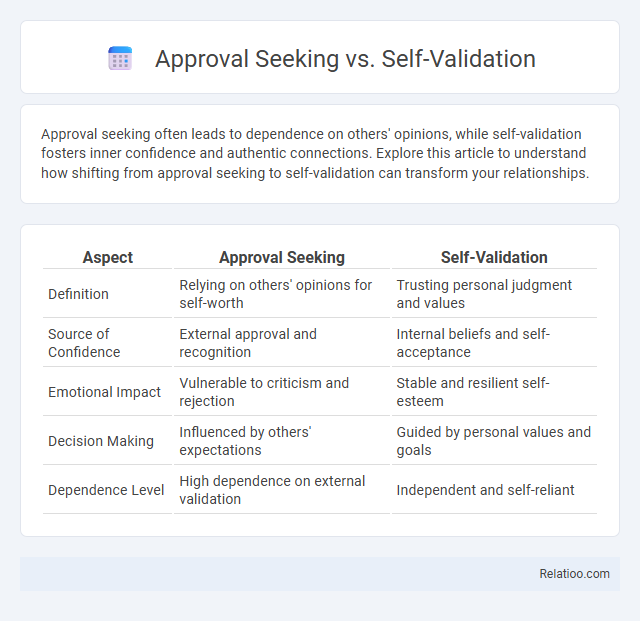Approval seeking often leads to dependence on others' opinions, while self-validation fosters inner confidence and authentic connections. Explore this article to understand how shifting from approval seeking to self-validation can transform your relationships.
Table of Comparison
| Aspect | Approval Seeking | Self-Validation |
|---|---|---|
| Definition | Relying on others' opinions for self-worth | Trusting personal judgment and values |
| Source of Confidence | External approval and recognition | Internal beliefs and self-acceptance |
| Emotional Impact | Vulnerable to criticism and rejection | Stable and resilient self-esteem |
| Decision Making | Influenced by others' expectations | Guided by personal values and goals |
| Dependence Level | High dependence on external validation | Independent and self-reliant |
Understanding Approval Seeking Behavior
Understanding approval seeking behavior involves recognizing the tendency to rely on external validation to feel worthy or accepted. Self-validation, in contrast, emphasizes trusting your own judgment and emotions without depending on others' opinions. Cultivating self-validation reduces the need for approval seeking, promoting emotional independence and authentic self-esteem.
The Roots of Self-Validation
The roots of self-validation lie in an intrinsic understanding of one's own worth, independent of external approval or social validation. Unlike approval seeking, which depends on others' acceptance to feel valued, self-validation emerges from internal acknowledgment and acceptance of personal beliefs, emotions, and actions. This foundational self-awareness fosters emotional resilience and authentic confidence, minimizing reliance on external validation mechanisms.
Key Differences Between Approval Seeking and Self-Validation
Approval seeking involves relying on external validation from others to feel worthy or successful, often leading to dependence on their opinions. Self-validation, by contrast, is rooted in internal acknowledgment and acceptance of your own feelings, values, and achievements, fostering greater emotional resilience and autonomy. Understanding these key differences helps you cultivate genuine self-worth without needing constant approval from others.
Psychological Impacts of Seeking External Approval
Seeking external approval often leads to diminished self-esteem and increased anxiety due to overreliance on others' validation. This behavior can cause emotional instability as individuals base their self-worth on fluctuating external feedback rather than internal self-validation. Prioritizing self-validation promotes resilience and psychological well-being by fostering intrinsic motivation and reducing vulnerability to social rejection.
The Benefits of Cultivating Self-Validation
Cultivating self-validation empowers you to trust your own judgment and make decisions aligned with your values, reducing dependence on external approval from others. This intrinsic confidence fosters emotional resilience, enabling you to navigate challenges without the constant need for validation. Embracing self-validation promotes authentic self-awareness and healthier relationships by prioritizing your own needs and perspectives.
Signs You May Be Seeking Approval
Constantly needing reassurance from others, fear of disappointing people, and difficulty making decisions without outside input are key signs of approval seeking. In contrast, self-validation relies on internal affirmation, where confidence is built through personal values and beliefs rather than external approval. Recognizing patterns like over-apologizing, people-pleasing behaviors, or avoiding conflict can indicate a dependence on approval seeking rather than authentic self-validation.
Barriers to Developing Self-Validation
Barriers to developing self-validation often stem from a deep-rooted dependence on external approval, which diminishes emotional autonomy and fosters insecurity. Social conditioning and past experiences of rejection can reinforce the habit of seeking validation from others, making it difficult to trust one's own judgment and feelings. Overcoming these barriers requires conscious effort to recognize self-worth internally and build resilience against external opinions.
Strategies to Shift from Approval Seeking to Self-Validation
Shifting from approval seeking to self-validation involves developing a strong sense of intrinsic worth and focusing on your personal values rather than external opinions. Techniques such as mindfulness, affirmations, and setting clear boundaries help reinforce your self-respect and reduce dependence on others' approval. Encouraging self-reflection and celebrating small achievements build resilience and foster genuine confidence in your abilities.
How Self-Validation Enhances Well-Being
Self-validation boosts well-being by fostering genuine self-acceptance and reducing reliance on external approval, which often leads to emotional instability. Your ability to affirm your own feelings and thoughts strengthens resilience and promotes mental health, contrasting with approval seeking that can cause anxiety and diminished self-worth. Embracing self-validation empowers you to build a stable sense of identity and improves overall life satisfaction.
Building Lasting Confidence Through Inner Validation
Building lasting confidence stems from self-validation, which involves recognizing and affirming your own worth independent of others' opinions. Unlike approval seeking, which relies on external validation and can lead to fluctuating self-esteem, self-validation fosters a stable inner foundation by acknowledging personal values and achievements. Cultivating this inner validation reduces dependency on approval seeking, enabling sustainable confidence that withstands external judgment or criticism.

Infographic: Approval Seeking vs Self-Validation
 relatioo.com
relatioo.com